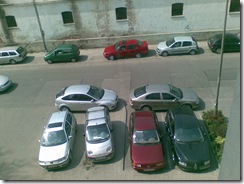I am not the first foreign person to notice this or even the first to write about it on their blog, but I will add my 2 cents anyhow ;)
Exact Change
Polish shop assistants have, in my opinion, an abnormal fixation on receiving the exact change meaning that you give them the exact amount of your total complete with all the coins and everything. The next best thing for the shop assistant is to receive an amount of change which allows them to give you back better change, meaning they can give you back, for example, a 20 instead of a 10 and some coins. What’s the reasoning behind this? I suppose, it is to hedge against all the yuppies who clean out the cash register with their fresh bank-o-mat hundreds, but I have often been shaken clean of all my change from a cashier whose cash register was overflowing with coins.
What can ya do?
This habit used to really bug me because even after all these years, I still have to look at the face of the smaller coins to recognize the amount. I usually do the dump-out-all-my-change-in-my-hand thing, turn all the coins over so the numbers are up, and then figure out what combination of these coins will please the shop assistant most. Now, I am much more easy-going and if I have the coins, I hand them over (of course, leaving my precious reserve for parking) sometimes without being asked.
Nie Wydam!
Ok, so the exact change thing I can deal with, but what gets my goat is “nie wydam” (I cannot make change). First of all, let me state that I worked in a clothing store at the mall while at uni, so I know what it means when your first customer of the day cleans out your register. Our store was new so after it happened a couple of times, we decided to increase the starting amount in each register from 200 to 300 dollars. In addition, we had another 300 in the safe in the back consisting of 1’s, 5’s, 10’s and coins. If for some reason that wasn’t enough, we made a trip to the neighboring shops and even to the bank if necessary. It never happened, but we had such a procedure just in case.
 So, after the third time the lady at Reserved Kids (something like Gap Kids) told me that she couldn’t make change (a 50 zloty banknote on a 40 zloty purchase) and asked if I could pay by card, I decided that I had had enough of Reserved and Reserved Kids. I left my purchases at the register and walked out of the store. It was a painful decision but I decided to boycott Reserved Kids….for 3 whole months. That’s as long as I made it ‘cause I really love that store. When I returned from my boycott (which I am sure hit them hard), I waited for what the sales assistant would say as I handed over my cash. Unsurprisingly, she couldn’t make change. I asked why in Reserved Kids they never have change and in (regular) Reserved they more often than not have the same problem. She replied, “Store policy.” Hmm, interesting store policy, to never have change for your customers and piss them off at every visit. Excellent store policy.
So, after the third time the lady at Reserved Kids (something like Gap Kids) told me that she couldn’t make change (a 50 zloty banknote on a 40 zloty purchase) and asked if I could pay by card, I decided that I had had enough of Reserved and Reserved Kids. I left my purchases at the register and walked out of the store. It was a painful decision but I decided to boycott Reserved Kids….for 3 whole months. That’s as long as I made it ‘cause I really love that store. When I returned from my boycott (which I am sure hit them hard), I waited for what the sales assistant would say as I handed over my cash. Unsurprisingly, she couldn’t make change. I asked why in Reserved Kids they never have change and in (regular) Reserved they more often than not have the same problem. She replied, “Store policy.” Hmm, interesting store policy, to never have change for your customers and piss them off at every visit. Excellent store policy.
 This week, however, I met my match.
This week, however, I met my match.
The lady from RUCH.
The Polish readers probably already know why.
If you are not in the know, RUCH is a newsagent which operated during communist times and continues to do business today. What you may not know is that you cannot win with the lady from RUCH. She is always right and you can go f@*# yourself.
I often go to the RUCH in question and my complaint is exclusive to this particular location. It is conveniently located for me near one of my clients. This particular RUCH is not a little kiosk, but more like a shop. It is always clean and well-organized and the shop lady is always nicely dressed and groomed. That being said, if there was a dirty, ugly place next door with a smelly but pleasant salesperson working, I would probably choose the smelly guy over this lady.
So a few days ago, I parked in front of RUCH, got out of my car and headed to the door…where I met my favorite lady backing her way out of the door with keys in hand.
Zamknięte. –she said. [We’re closed]
A Pani wróci ? – I asked. [You’re coming back?]
Tak. – she answered. [Yes]
No to czekam. – I said. [I’m waiting.]
 She was surprised that I wanted to wait, but I was early for my lesson so I thought –what the hey- I will wait. I don’t know where the lady, went but she missed out on 2 customers during her absence. She didn’t even hang the “zaraz wracam” sign. [Be right back]
She was surprised that I wanted to wait, but I was early for my lesson so I thought –what the hey- I will wait. I don’t know where the lady, went but she missed out on 2 customers during her absence. She didn’t even hang the “zaraz wracam” sign. [Be right back]
Finally, she was back so I went in after her along with another guy. I know what I wanted, I had had time to figure it out while I waited and I plunked down my meager purchases on the counter while the other customer perused the press. I handed over a 50 to which I heard a mumbled response.
Proszę. Nie słyszałam. – I said [Pardon. I didn’t hear.]
Proszę Pani. Ja nie wydam! – The RUCH lady shouted peering at me from over the top of her glasses which rested at the end of her nose. [Ma’am, I will not make change.]
Hmm. Za ile musze kupić żeby Pani mogła mi wydać? – I asked. [Hmm. How much do I have to spend in order for you to be able to make change?]
No, no, no, proszę Pani, ja nie wiem za ile Pani musi kupić żeby wydać – she answered throwing her hands up in exasperation. [Well, well, well, Ma’am, I don’t know how much you have to spend for me to make change.]
My reply – A kto wie jeżeli Pani nie wie? [Who knows if you don’t know?]
She wasn’t happy with that comment.
Wszyscy ludzie tutaj przychodzą prosto z bankomatu i mam same pięćdziesiątki i stówki i nie wydam Pani. [Everybody comes in here straight from the ATM with 50’s and 100’s and I won’t make you change.]
Chyba Pani musi. – I answered, meaning that she has to make change in order to serve her clients…she understood it a little differently. [I think you have to.]
Ja jako sprzedawca nie mam obowiązku wydać resztę tylko klient ma obowiązek zapłacić daną kwotę. – she explained. [As a merchant, I am not required to make change. It is the customers’ responsibility to pay the right amount.]
Ale w taki sposób Pani nic nie sprzeda. – I countered. [But that way, you won’t sell anything.]
At that moment, the guy behind shouted – Pani nie wyda z 50tki? [You can’t change a 50?]
Nie. [No.]
As if I had planted this customer to prove my point, he put his purchases back on the shelf and left. I took back my 50 and did the same.
Do widzenia – I said. [Good bye]
Do widzenia, Pani. [Good bye, Ma’am]
And 30 minutes of work for this lady, from locking the door in front of me to my leaving the shop, resulted in 4 potential customers who spent 0 zloty. Excellent policy, excellent.























